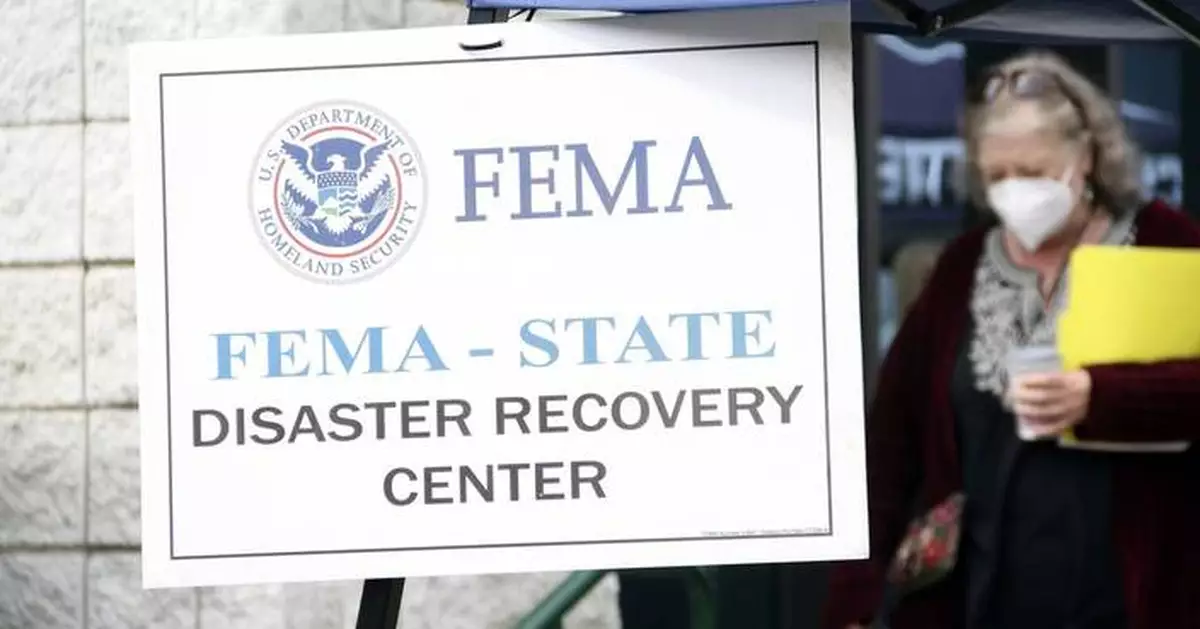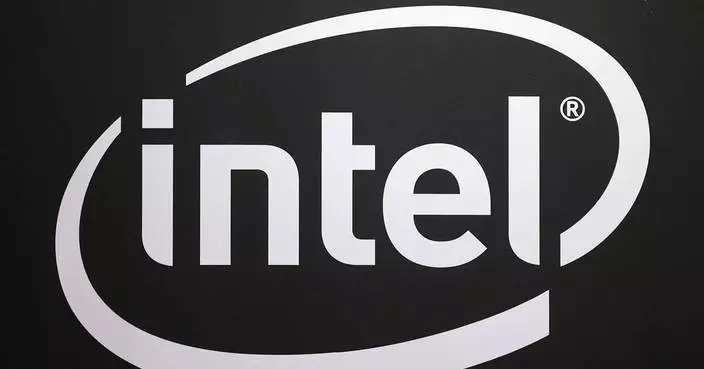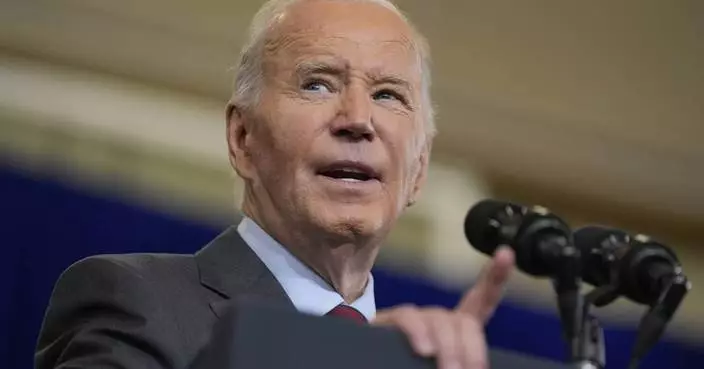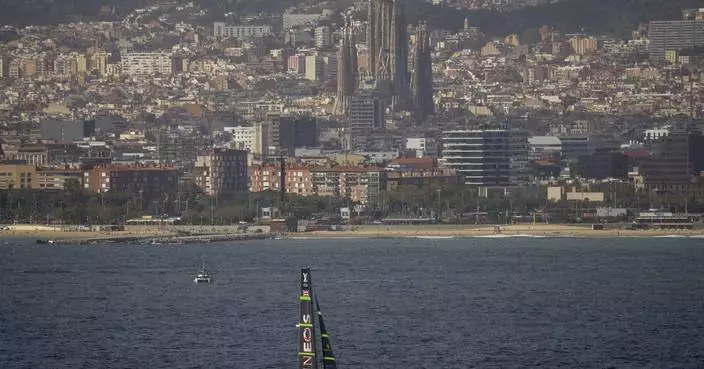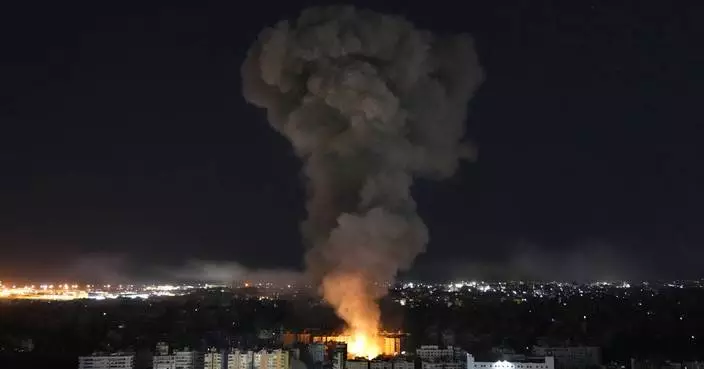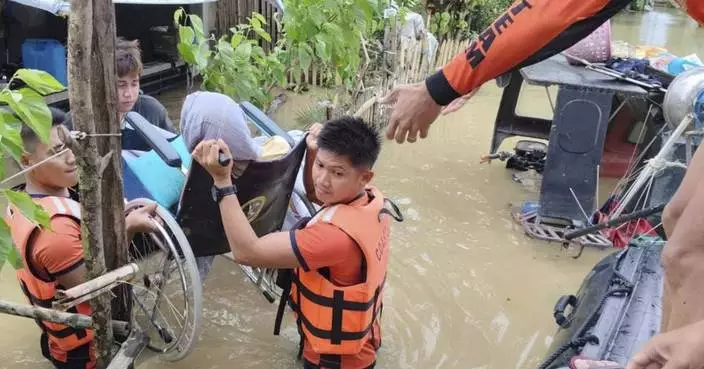WASHINGTON (AP) — Russia has helped amplify and spread false and misleading internet claims about recent hurricanes in the United States and the federal government's response, part of a wider effort by the Kremlin to manipulate America's political discourse before the presidential election, new research shows.
The content, spread by Russian state media and networks of social media accounts and websites, criticizes the federal response to Hurricanes Helene and Milton, exploiting legitimate concerns about the recovery effort in an attempt to paint American leaders as incompetent and corrupt, according to research from the Institute for Strategic Dialogue. The London-based organization tracks disinformation and online extremism.
In some cases, the claims about the storms include fake images created using artificial intelligence, such as a photo depicting scenes of devastating flooding at Disney World that never happened, researchers say.
The approach is consistent with the Kremlin’s long-standing practice of identifying legitimate debates and contentious issues in the U.S. and then exploiting them. Previous disinformation campaigns have harnessed debates about immigration, racism, crime and the economy in an effort to portray the U.S. as corrupt, violent and unjust.
U.S. intelligence officials and private tech companies say Russian activity has increased sharply before the Nov. 5 election as Moscow tries to capitalize on an opportunity to undermine its chief global adversary.
By seizing on real concerns about disaster recovery, Russia's disinformation agencies can worm their way into U.S. discourse, using hot-button issues to undermine Americans' trust in their government and each other.
“These are not situations that foreign actors are creating," said Melanie Smith, director of research at ISD. “They're simply pouring gasoline on fires that already exist.”
The content identified by ISD included English-language posts obviously meant for Americans, as well as Russian-language propaganda intended for domestic audiences. Much of the disinformation took aim at the Federal Emergency Management Agency and the Democratic administration of President Joe Biden and Vice President Kamala Harris. She is her party's nominee in the White House race against former President Donald Trump.
Russia's invasion of Ukraine remains the Kremlin's prime motivation for spreading lies about the hurricane response. If Russia can persuade enough Americans to oppose U.S. support for Ukraine, that could ease the way for a Moscow victory, officials and analysts have said.
U.S. intelligence officials have said Russia's disinformation seems designed to support Trump, who has praised Russian President Vladimir Putin and disparaged the NATO alliance and Ukraine's leaders. Posts linked to Russia routinely denigrate Harris, saying she is ignoring the pleas of storm victims. By contrast, a recent post from Russian state media company RT called Trump “a mystical figure of historic proportions.”
Intelligence officials confirmed Tuesday that Russia created a manipulated video to smear Harris’ running mate, Minnesota Gov. Tim Walz.
Russia has rejected claims that it trying to meddle in the U.S. election. The Russian Embassy hasn't responded to messages this week seeking comment about recent allegations by researchers and intelligence officials.
Researchers at ISD found that Russian disinformation agents exploited weak content moderation on U.S.-owned social media platforms such as X to spread their content far and wide. Before it was purchased and renamed by Elon Musk, the platform once known as Twitter required labels on content from authoritarian state media. Musk rescinded that rule and gutted the platform's content moderation efforts, leading to a surge in foreign propaganda, hate speech and extremist recruitment.
Often the false or misleading claims come from fake accounts or websites that mimic Americans or legitimate news outlets, making it difficult to determine their true origin. Unsuspecting Americans then repost and spread the content.
In July, American intelligence officials warned that “unwitting Americans” were helping do Russia's work for it.
Vast armies of fake or automated accounts help spread the material further.
Researchers at the Israeli tech firm Cyabra analyzed popular posts on X that criticized FEMA for its storm response. A significant number could not be verified as belonging to a real person; one-quarter of all the responses to popular posts were deemed fake. The posts were seen by users over half a billion times.
In response, a spokesperson for X pointed to the platform's system that allows users to add context to posts with false claims. The company did not respond to questions about its labeling policy.
“The false claims, ranging from FEMA diverting funds to aid migrants to conspiracy theories about weather manipulation, undermine public trust in government as we near election day, which could seriously impact voter confidence," Cyabra researchers said in a report.
Politicians also have helped spread Russia's talking points.
Rep. Paul Gosar, R-Ariz., gave an interview to the Russian state media outlet Sputnik News for a piece that played up criticism of the hurricane response. He told Sputnik that the federal response was "nonexistent," a claim easily debunked by photos and videos of FEMA recovery workers as well as the firsthand accounts of local leaders and residents in hard-hit regions.
Gosar repeated another misleading claim that “billions of FEMA disaster funds” had been given instead to immigrants without legal status. In truth, money that funds U.S. border control and immigration programs comes from a different source than disaster funds.
Gosar's office did not respond to messages seeking comment Wednesday.
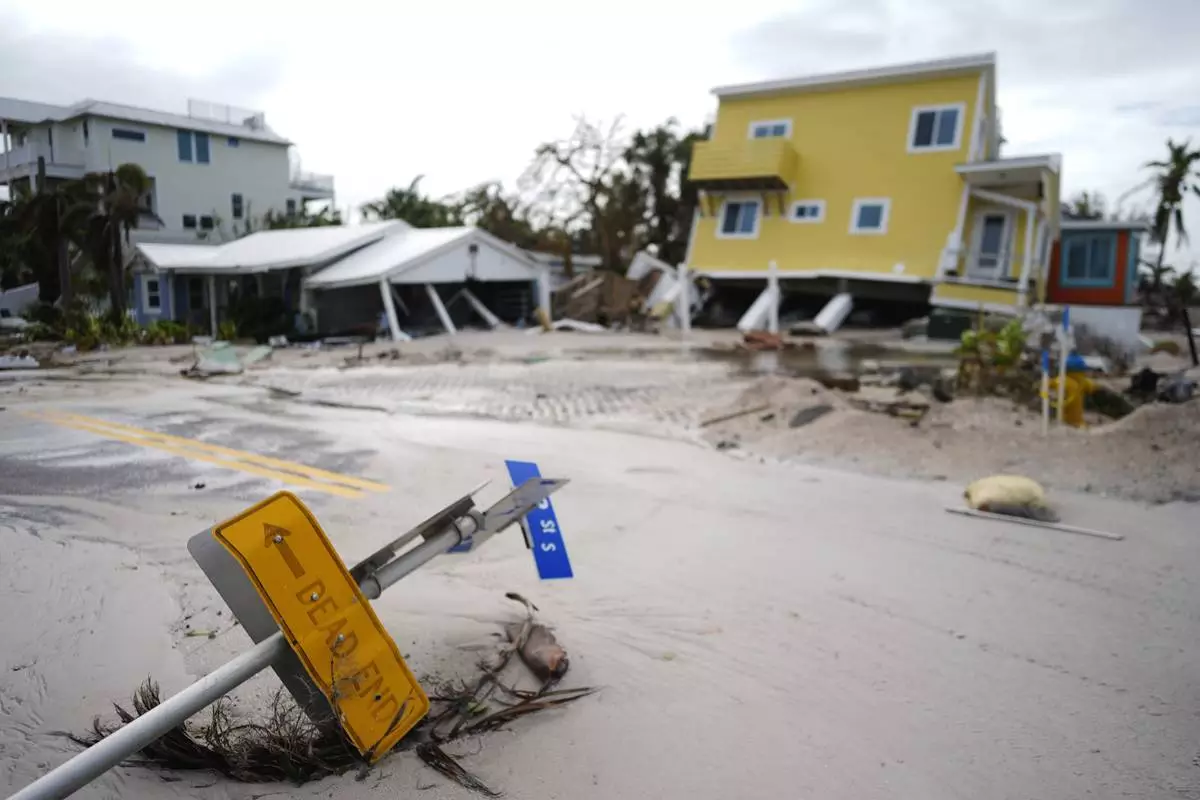
FILE - A house sits toppled off its stilts after the passage of Hurricane Milton, alongside an empty lot where a home was swept away by Hurricane Helene, in Bradenton Beach on Anna Maria Island, Fla., Oct. 10, 2024. (AP Photo/Rebecca Blackwell, File)
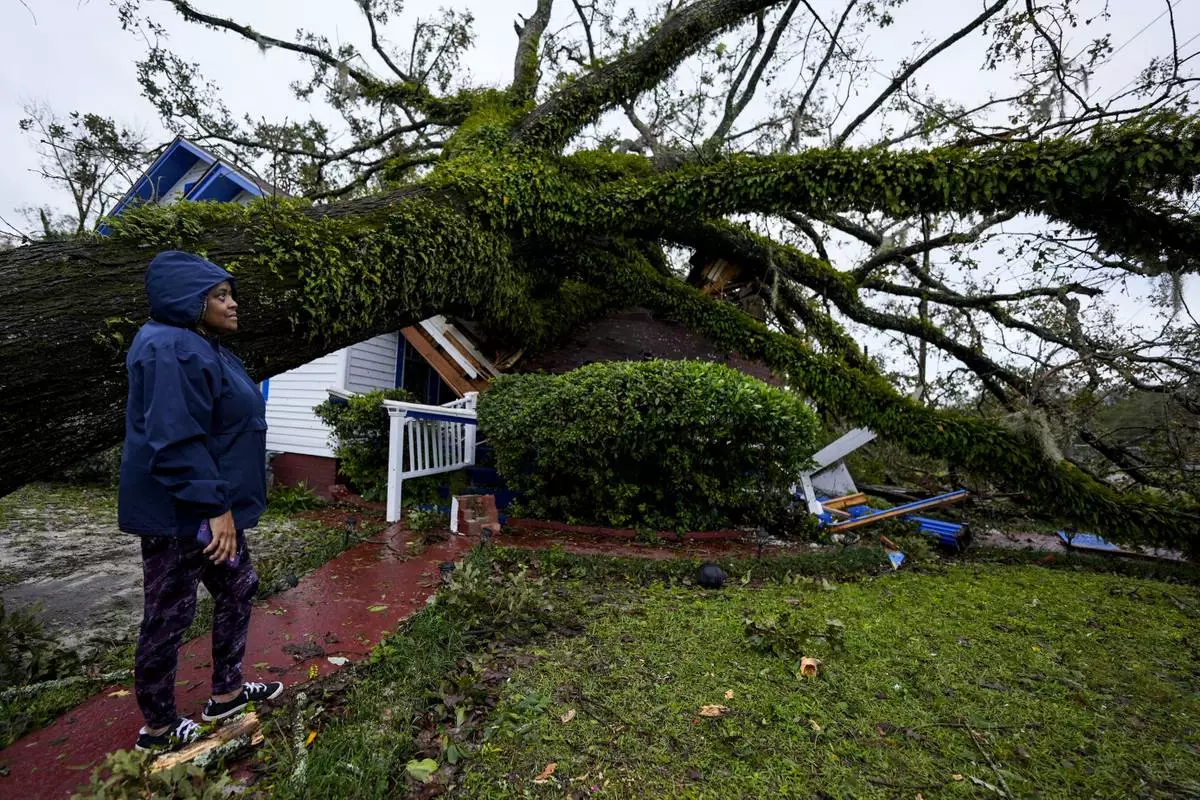
FILE - Rhonda Bell looks on after an Oak tree landed on her 100-year-old home after Hurricane Helene moved through, Friday, Sept. 27, 2024, in Valdosta, Ga. (AP Photo/Mike Stewart, File)
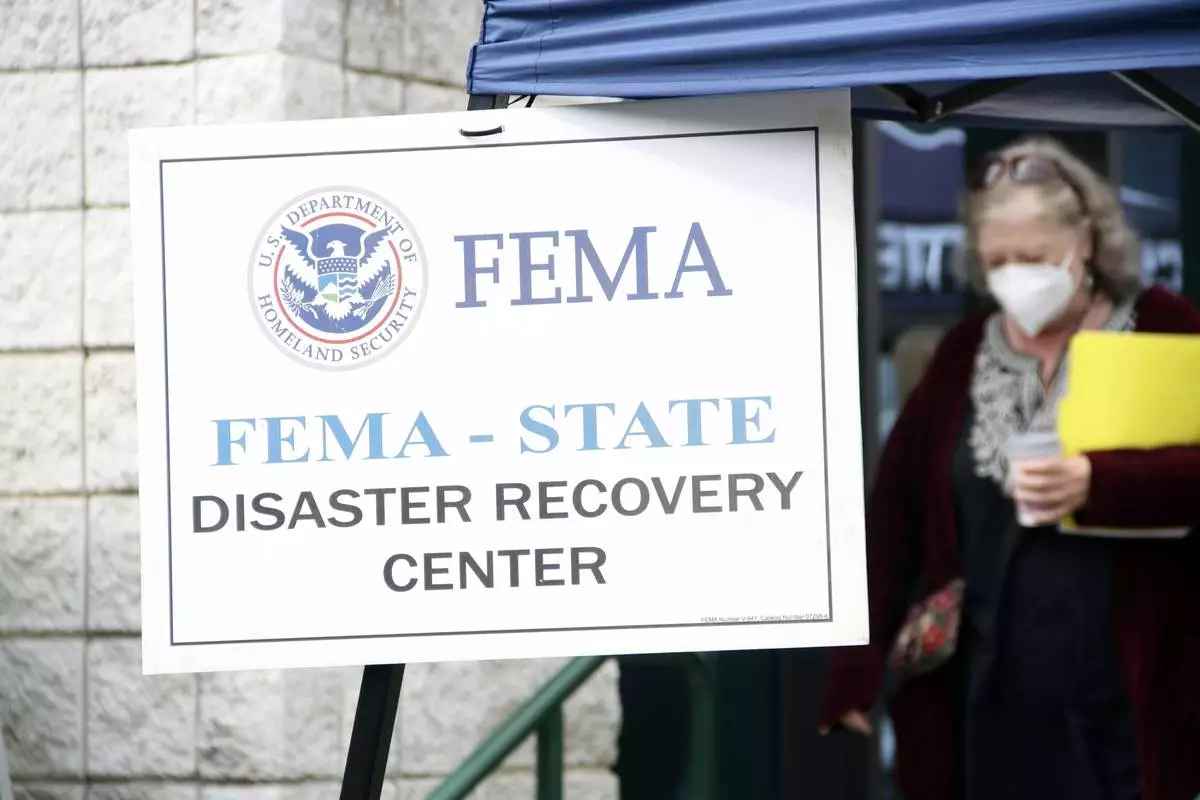
People gather at a FEMA Disaster Recovery Center at A.C. Reynolds High School in Asheville, N.C.,, Tuesday, Oct. 15, 2024. (AP Photo/Makiya Seminera)
SEOUL, South Korea (AP) — South Korea’s president on Thursday raised the possibility of supplying Ukraine with weapons while stressing that his government “won’t sit idle” as North Korea allegedly sends troops to support Russia’s aggression toward its neighbor.
South Korean President Yoon Suk Yeol spoke to reporters after a meeting with Polish President Andrzej Duda that came a day after U.S. and South Korean officials said they believe around 3,000 North Korean troops have been deployed to Russia and are training at several locations. South Korea’s spy agency told lawmakers that North Korea likely aims to send a total of 10,000 troops to Russia by the end of the year.
Yoon’s meeting with Duda was focused on expanding defense cooperation between the countries amid the ongoing conflict. Poland has signed a series of arms deals with South Korea in the last two years to acquire tanks, howitzers and missile launchers in an effort to bolster its military capabilities following Russia’s invasion of Ukraine.
Both Moscow and Pyongyang have denied the presence of North Korean troops.
Yoon said South Korea will work with allies and partners to prepare countermeasures that could be rolled out in stages depending on the degree of military cooperation between Pyongyang and Moscow.
Seoul’s steps could potentially include sending weapons to Ukraine, which would mark a departure from a long-standing policy of not supplying weapons to countries actively engaged in conflict, Yoon said. He said North Korea’s alleged troop deployment to Russia is a “provocation that threatens global security beyond just the Korean Peninsula and Europe.”
“If North Korea dispatches special forces to the Ukraine war as part of Russia-North Korea cooperation, we will support Ukraine in stages and also review and implement measures necessary for security on the Korean Peninsula,” Yoon said during a joint press conference with Duda.
“While we have maintained our principle of not directly supplying lethal weapons, we can also review our stance more flexibly, depending on the level of North Korean military activities," Yoon said.
Yoon’s comments aligned with what a senior presidential official told reporters on condition of anonymity earlier this week. That official said South Korea is considering various diplomatic, economic and military options, including supplying Ukraine with both defensive and offensive weapons systems.
South Korea, a growing arms exporter, has provided humanitarian aid and other non-lethal support to Ukraine and joined U.S.-led economic sanctions against Moscow. It has so far resisted calls by Kyiv and NATO to directly supply Ukraine with weapons.
During their summit, Yoon and Duda agreed to “actively support” additional deliveries of South Korean military equipment to Poland, including a new deal for Korean K-2 tanks the governments hope to finalize within this year, Yoon’s office said.
Tensions on the Korean Peninsula have worsened since 2022 after North Korean leader Kim Jong Un used Russia’s invasion of Ukraine as a distraction to accelerate the growth of his nuclear weapons and missile program.
Seoul also worries as experts say the North may seek major technology transfers in return for sending troops, including Russian know-how on intercontinental ballistic missiles and submarines that would advance the threat posed by Kim’s nuclear arsenal.
Experts say it’s unclear how effective the North Korean soldiers would be in combat, considering their lack of active battlefield experience, outdated conventional weaponry and training experience with Russian forces. Kim may see the troop dispatch as a crucial opportunity to expose his soldiers to modern warfare and technologies, said Hong Min, an analyst at Seoul’s Korea Institute for National Unification.
During a parliamentary hearing, South Korean Defense Minister Kim Yong Hyun said that North Korean troops would likely become “cannon fodder” when deployed in combat in Ukraine and denounced Pyongyang’s leadership for “selling away its troops to an illegal invasion.”
“Troop deployment is just a phrase, and it would be more appropriate to call them as mercenaries,” he said. “The North Koreans are disguising themselves in Russian uniforms and operating under Russian control with no operational autonomy, just simply following orders.”
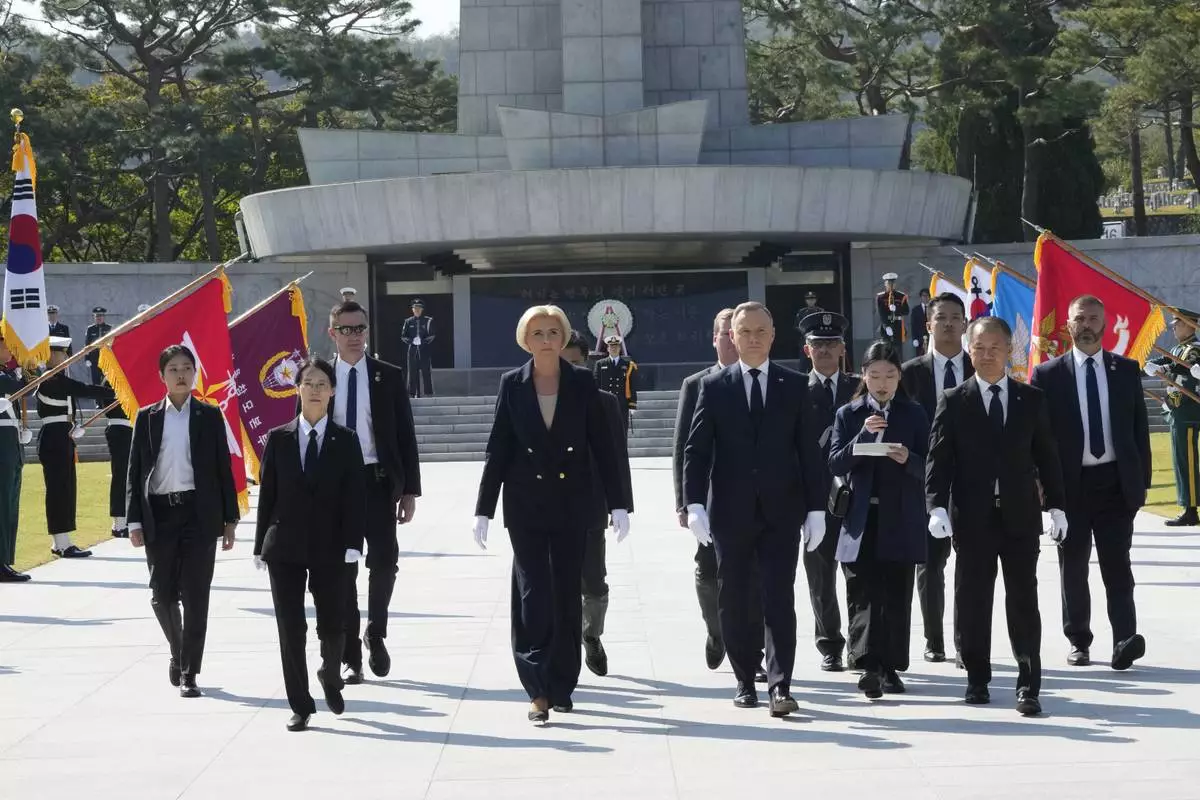
Polish President Andrzej Duda, center right, and his wife Agata Kornhauser-Duda, center left, visit the National Cemetery in Seoul, South Korea, Thursday, Oct. 24, 2024. (AP Photo/Ahn Young-joon)
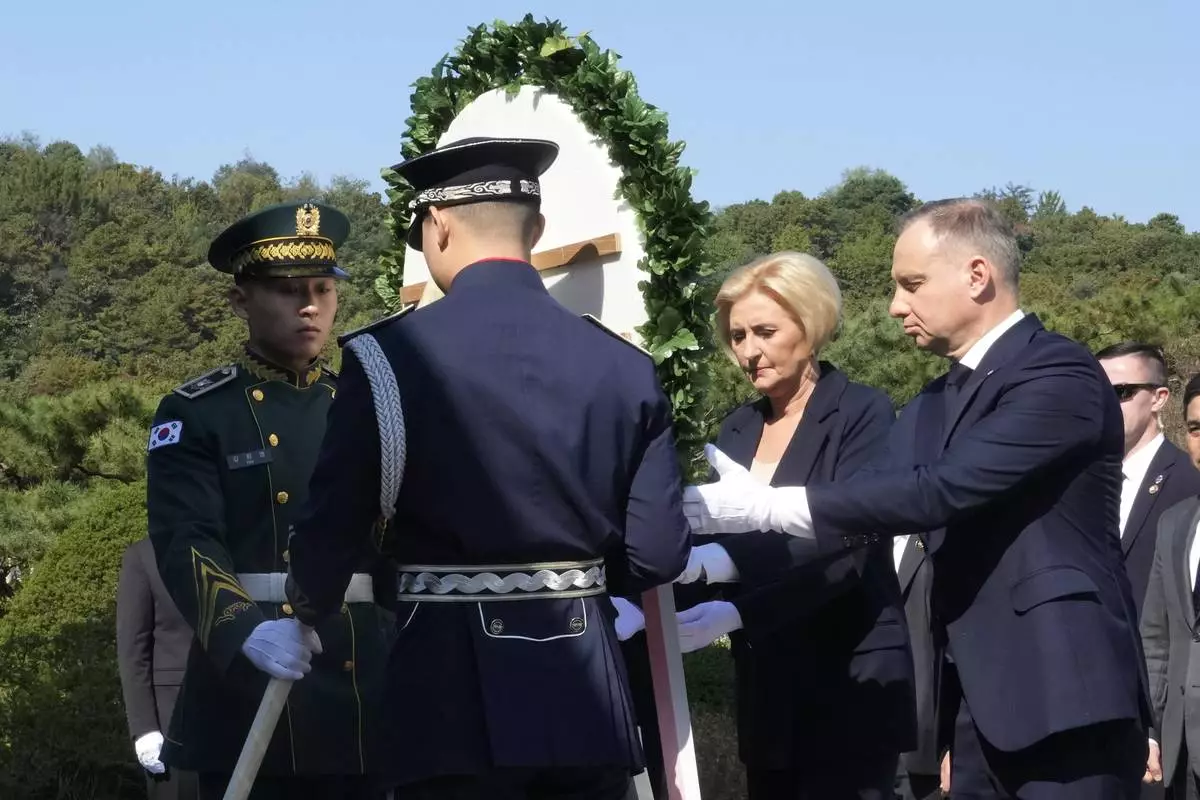
Polish President Andrzej Duda, right, and his wife Agata Kornhauser-Duda offer a wreath at the National Cemetery in Seoul, South Korea, Thursday, Oct. 24, 2024. (AP Photo/Ahn Young-joon)
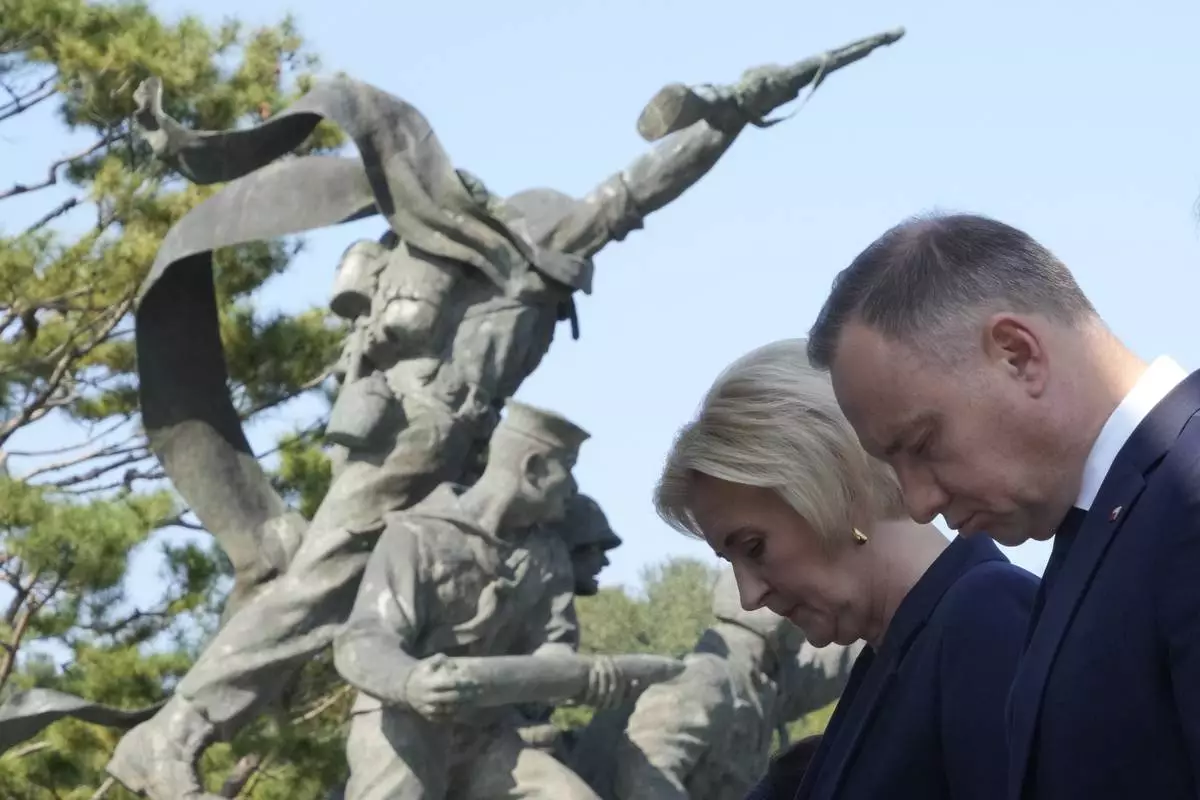
Polish President Andrzej Duda, right, and his wife Agata Kornhauser-Duda pay a silent tribute at the National Cemetery in Seoul, South Korea, Thursday, Oct. 24, 2024. (AP Photo/Ahn Young-joon)
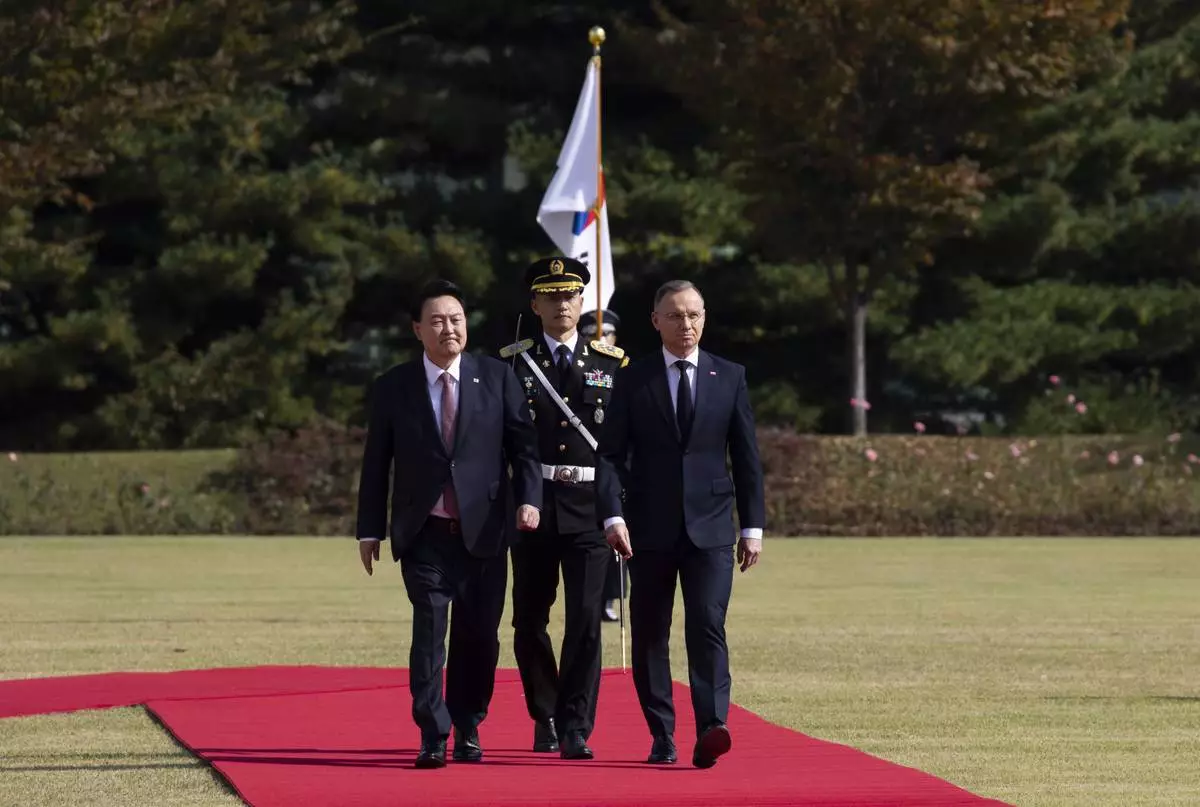
South Korean President Yoon Suk Yeol, left, and Poland's President Andrzej Duda, right, walk with honor guards during a welcoming ceremony at the Presidential Office in Seoul, South Korea, Thursday, Oct. 24, 2024. (Jeon Heon-Kyun/Pool Photo via AP)
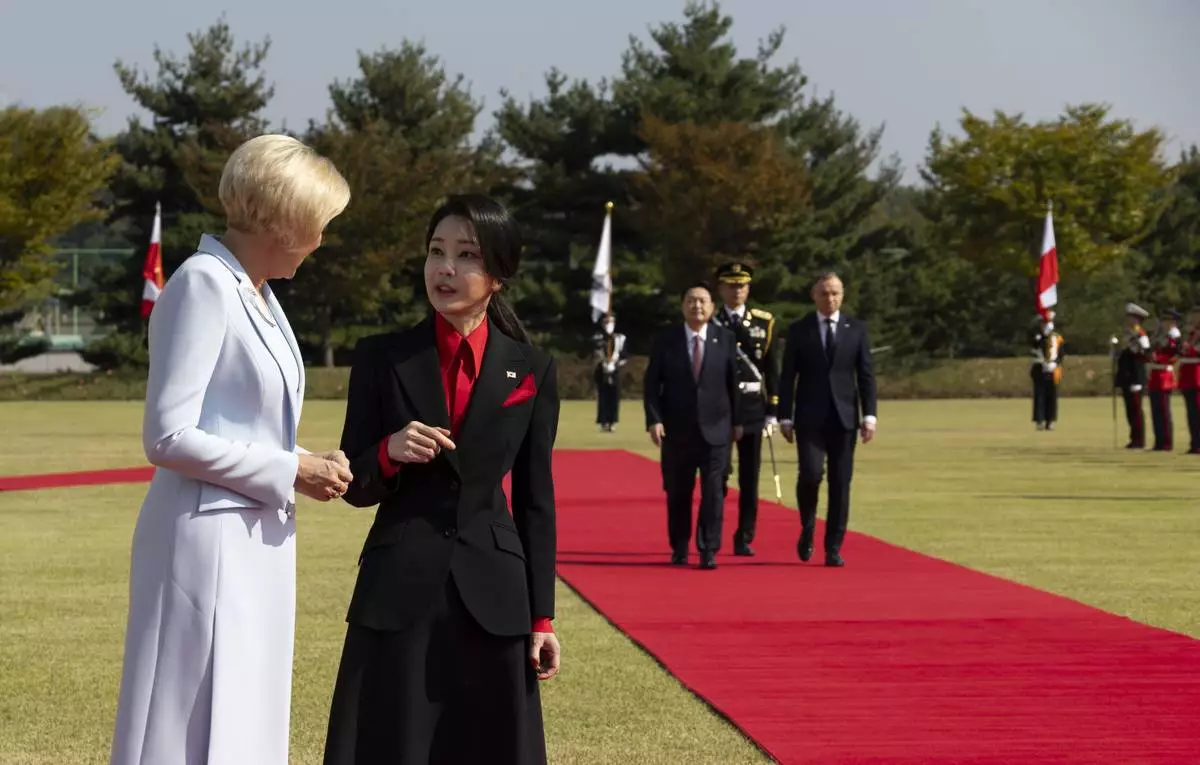
South Korean first lady Kim Keon-Hee, second from left, talks with Polish first lady Agata Kornhauser-Duda, left, as South Korea's President Yoon Suk Yeol, third from left, and Poland's President Andrzej Duda, right, walk with honor guards during a welcoming ceremony at the Presidential Office in Seoul, South Korea, Thursday, Oct. 24, 2024. (Jeon Heon-Kyun/Pool Photo via AP)
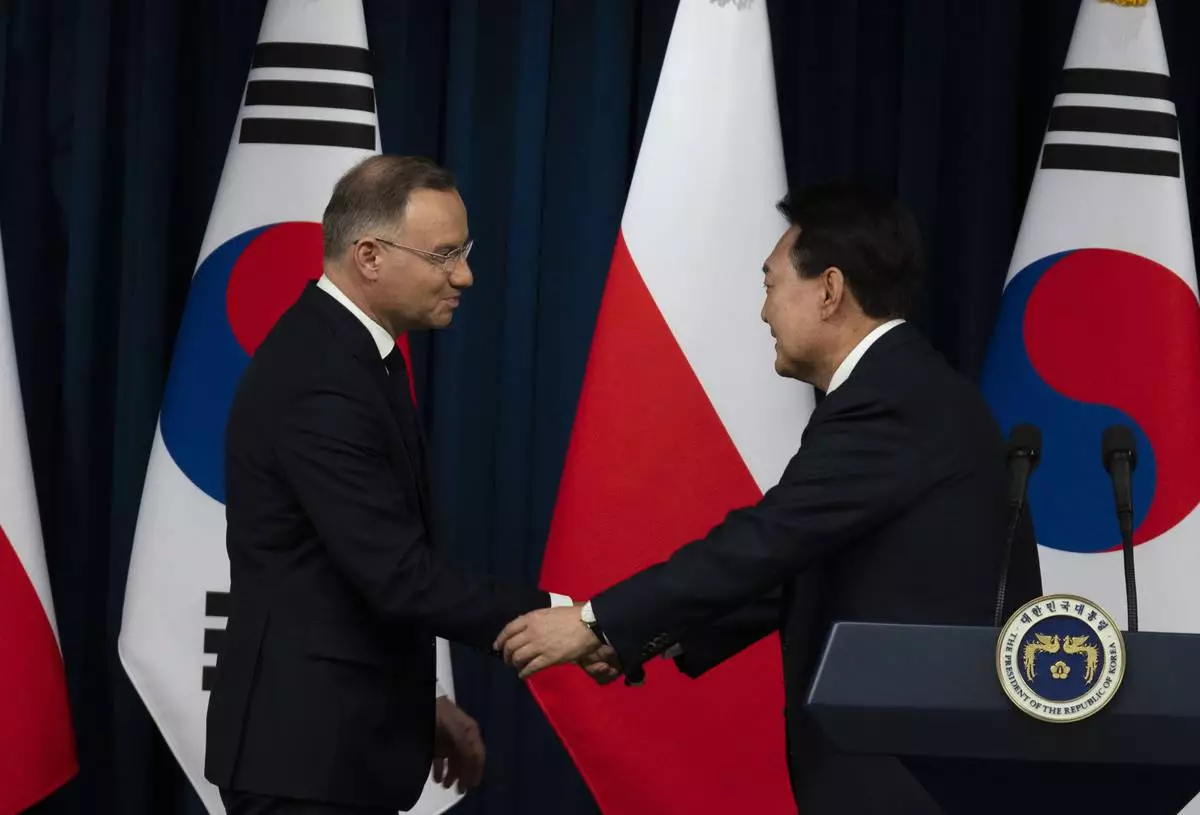
South Korean President Yoon Suk Yeol, right, and Poland's President Andrzej Duda, left, shake hands after a joint press conference at the Presidential Office in Seoul, South Korea, Thursday, Oct. 24, 2024. (Jeon Heon-Kyun/Pool Photo via AP)
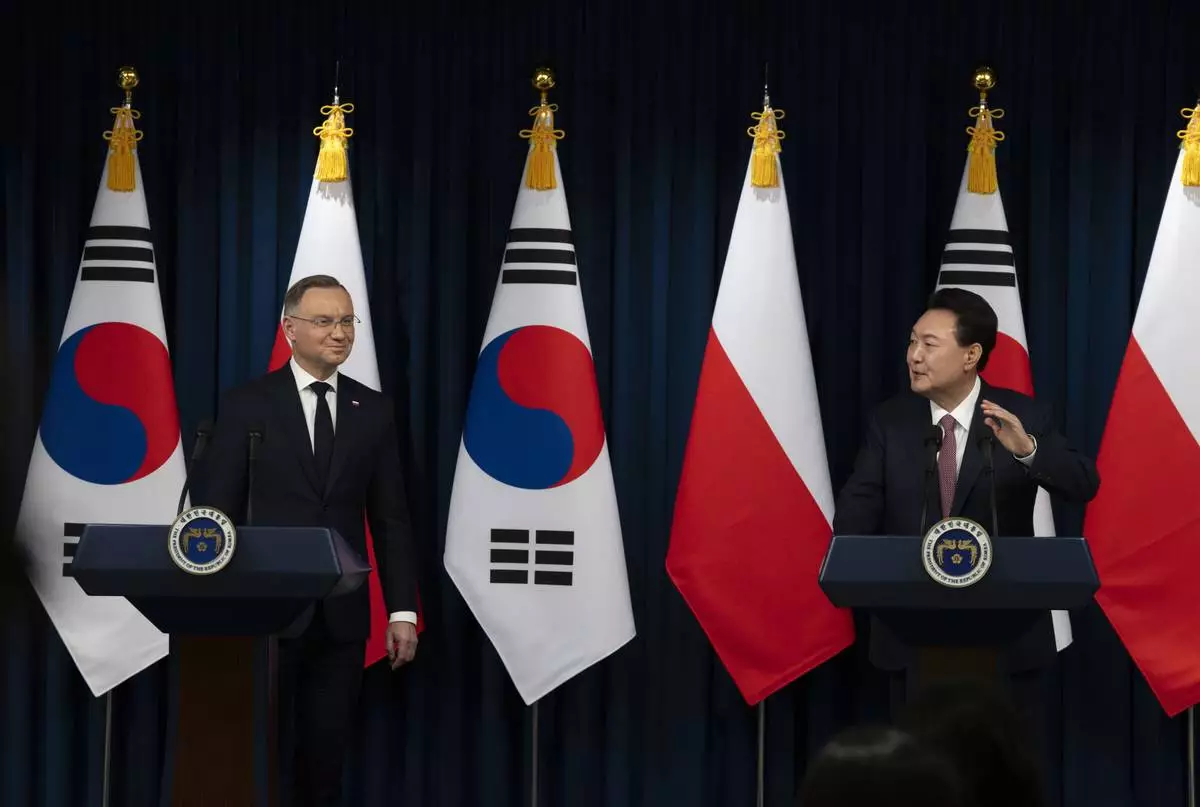
South Korean President Yoon Suk Yeol, right, and Poland's President Andrzej Duda, left, speak during a joint press conference at the Presidential Office in Seoul, South Korea, Thursday, Oct. 24, 2024. (Jeon Heon-Kyun/Pool Photo via AP)
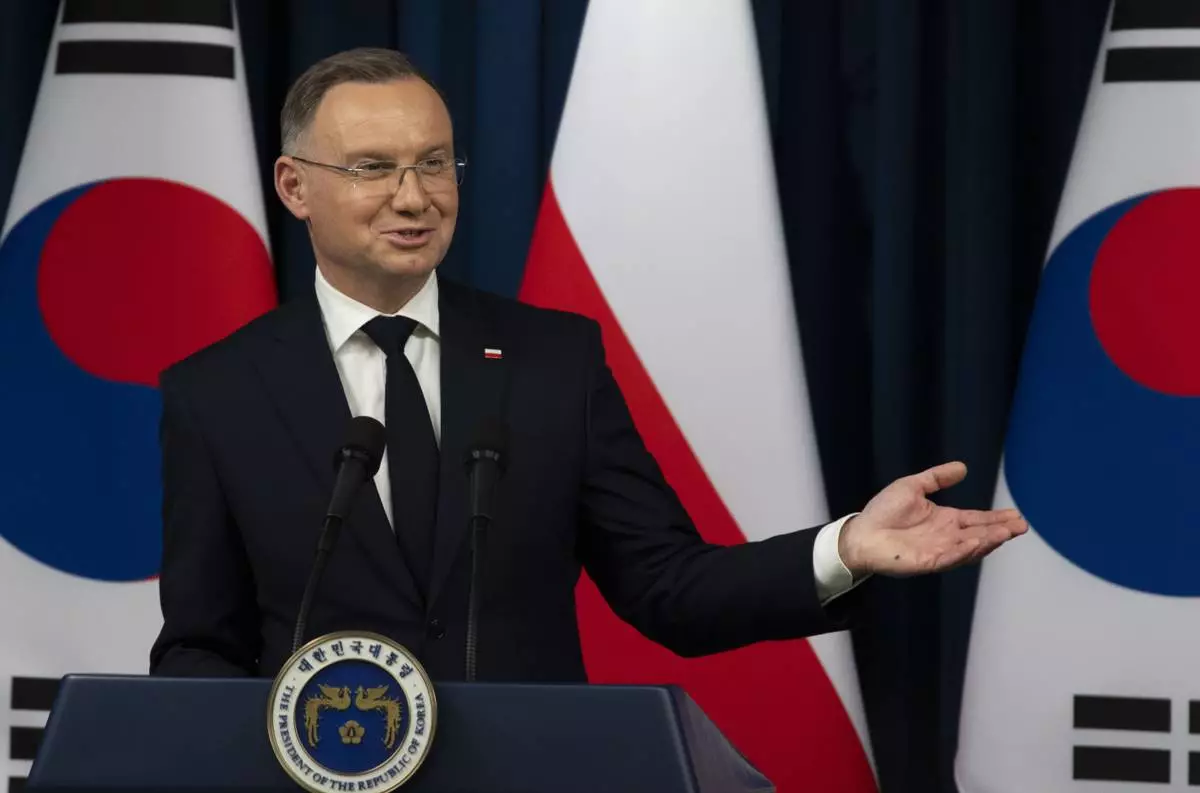
Poland's President Andrzej Duda, speaks during a joint press conference with South Korean President Yoon Suk Yeol, unseen, at the Presidential Office in Seoul, South Korea, Thursday, Oct. 24, 2024. (Jeon Heon-Kyun/Pool Photo via AP)
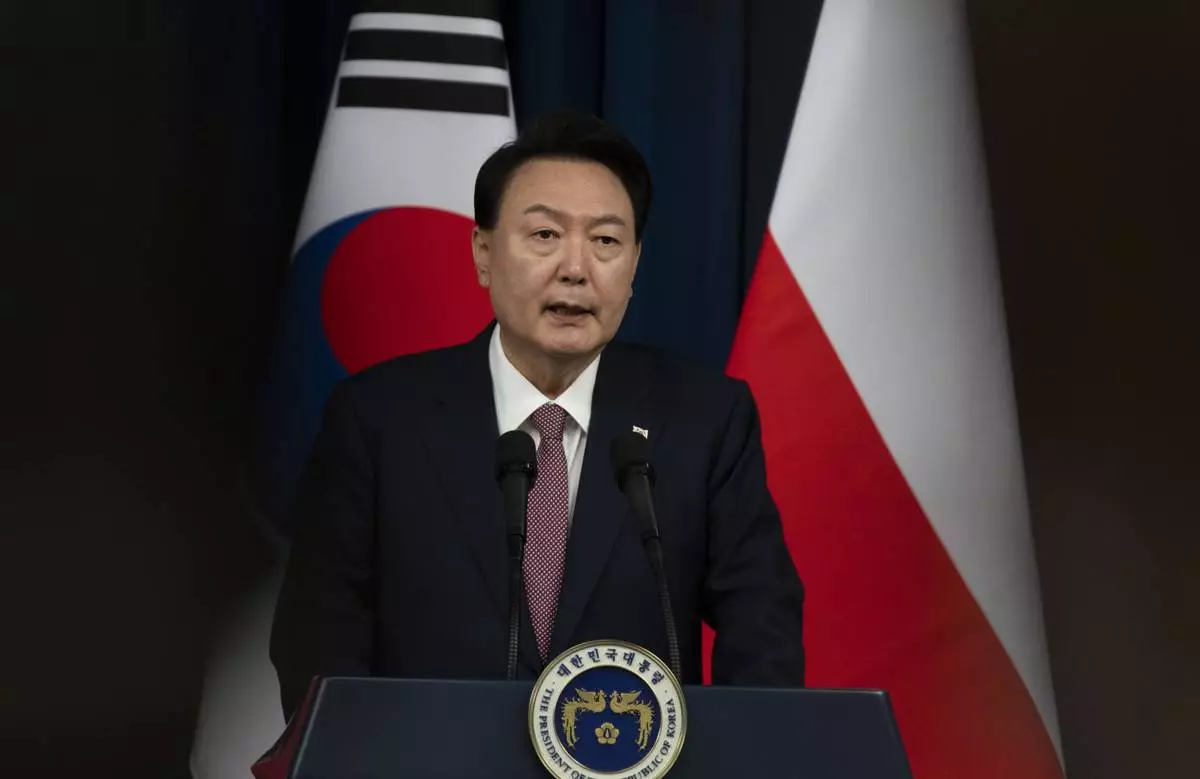
South Korean President Yoon Suk Yeol, speaks during a joint press conference with Poland's President Andrzej Duda, unseen, at the Presidential Office in Seoul, South Korea, Thursday, Oct. 24, 2024. (Jeon Heon-Kyun/Pool Photo via AP)





